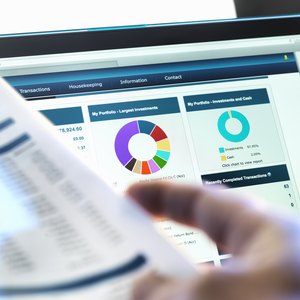
Trading portfolios are not flat cases containing loose papers. Rather, they are accounts consisting of different investment vehicles. A trading portfolio is another way of referring to an investment portfolio. The Cambridge Dictionary defines an investment portfolio as a collection of investments owned by an individual or business.
How a portfolio is populated and managed will depend on factors such as diversification and risk. Market conditions and foreign affairs can also impact investments. A trading portfolio may consist of a single financial asset class or a range of products to achieve intended outcomes.
What Is an Investment Portfolio?
An investment portfolio is specifically assembled with the intent of generating a profit while preserving assets, according to the Corporate Finance Institute. The definition of portfolio management is the selection and oversight of assets within that portfolio.
Asset types may include stocks, bonds, mutual funds and cash equivalents or alternative asset classes, such as cryptocurrencies and real estate. Investing strategies will vary by investor and risk tolerance. Building a diversified portfolio is often beneficial as a strategy. Buying and selling are known as taking a position.
In the past, money managers generally managed the activity in a trading portfolio. A portfolio manager will decide on asset allocation and how best to maintain a balanced portfolio. Today, more and more investors manage their trading portfolios, acting as their own portfolio managers. High-net-worth individuals still typically utilize a money manager.
What Is Holding vs. Active Trading?
Trading portfolios can consist of actively traded short-term and long-term buy-and-hold investments. Traders after quick profits will take an active approach to investing, seeking shorter-term gains versus long-term appreciation. Investors who use a buy-and-hold strategy invest for long-term appreciation. These goals will determine investing strategies.
For example, a collection of dividend stocks might be considered an income portfolio intended to provide a fixed income for an investor. This is an example of a buy-and-hold investing strategy, and the portfolio will be managed accordingly. Holding is often associated with lower risk tolerance, and it is a common approach to retirement investing.
Active investors buy and sell more often, owing to higher risk tolerance. Day trading is one very active style of investing and refers to individuals who buy and sell the same securities within the same day. It is a high-risk investing style, and financial institutions monitor this activity very closely. A pattern day trader who day trades four days out of five must meet the margin requirements outlined by the Financial Industry Regulatory Authority.
How Are Trading Portfolios Taxed?
After an investment asset is sold and the position is closed, the loss or profit from that sale will be classified as either a capital gain or loss. A capital gain is taxable income. The IRS determines the tax rate based on whether the asset was held for longer than a year, which is referred to as long term. Alternatively, if an asset was not owned for a full year, it is categorized as short term.
Tax implications for actively traded assets can significantly differ from buy-and-hold because these assets are often not held for a year. Short-term investments are taxed at the same rate as ordinary income. This can reach the maximum tax rate of 37 percent and may trigger the Alternative Minimum Tax. The capital gains rates on investments that are held for a year or longer are much lower, capping at 20 percent.
One exception to the short-term capital gains tax treatment is the trader tax status. Day traders registered with the IRS can write off trading expenses and deduct losses greater than the usual $3,000. They are not subject to self-employment tax or the wash sale exclusion. Trader tax status is also available for those who actively trade cryptocurrencies.
References
Writer Bio
Hashaw Elkins is a financial services and tax professional, as well as a project management consultant. She has led projects across multiple industries and sectors, ranging from the Fortune Global 500 to international nongovernmental organizations. Hashaw holds an MBA in Real Estate and an MSci in Project Management. She is further certified in organizational change management, diversity management, and cross-cultural mediation.

